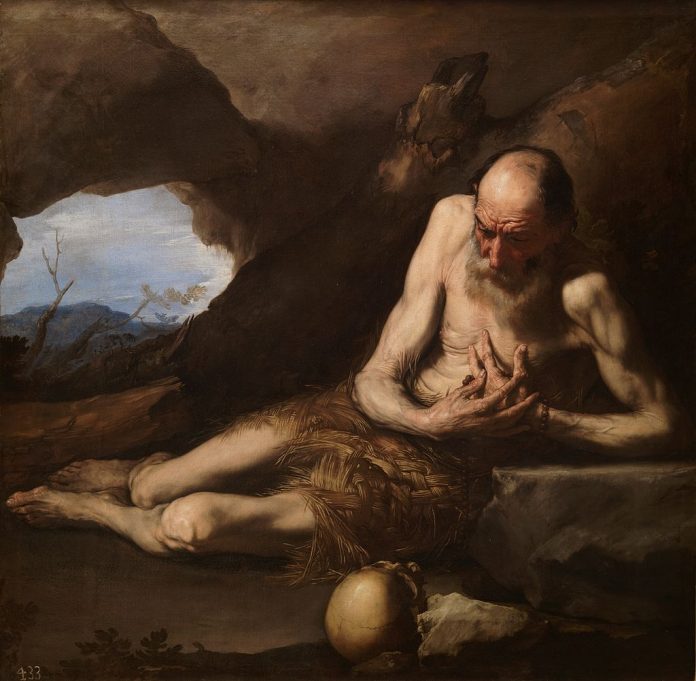Saint Paul of Thebes (+ 341) is traditionally considered the first hermit in the Catholic Church, if we don’t include John the Baptist, who is a liminal figure between the two Testaments. But there is a similarity, for as a young man of 16 – yes, they were men back then at that age – embroiled in an inheritance dispute with his brother, Paul fled into the desert, where he remained, in a cave, where a palm tree and a spring provided for his bodily needs (until a raven began bringing a daily portion of bread, when the saint was about 43). There he worked and prayed for the next century (!), dying at the venerable age of 116.
From what accounts we do have of his hidden life, Paul did not interact with many people at all, and was a true solitary. There was the famous meeting with Saint Anthony the Great, who was told of Paul in a dream, and went to find him, by which point the hermit was a tender 113. They met for a day and a night, and shared a loaf of bread. Paul gave Anthony his poor cloak made of palm leaves, which Anthony (whose own eremitical life was made famous by Saint Athanasius) treasured for his long life, wearing it only at Easter and Pentecost. Anthony called Paul ‘the first monk’, which is quite the honour.
When Anthony returned a few years later – time works differently for hermits, for whom three years might seem three days – Paul lay peacefully dead. Anthony buried him, with the help of two lions.
Saint Paul the Hermit not only kept his sanity in his life of solitude, but grew to the heights of holiness, his reputation spreading quickly, and continuing to this day. There is a parish in my own diocese – on the Quebec side – named after him, and the site of his death is still a Coptic monastery, also under his patronage. His feast is kept on January 10th in the current Roman martyrology, and on January 15th in the usus antiquior and Eastern Orthodox.
Amare nesciri – love to be unknown, Saint Philp Neri said, who himself lived an eremitical life for a time. As the Second Vatican Council decree on religious life, Perfectae Caritatis, says, the contemplative life is as effective as it is hidden. God make His own known, in ways that are as surprising, as they are mysterious.
Saint Paul the Hermit, et ora pro nobis! +
Source: Wikipedia.org
Cf., also, Saint Jerome’s Vitae Patrum.

